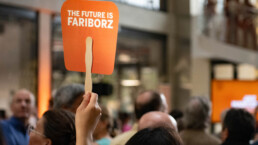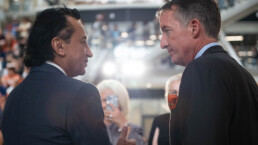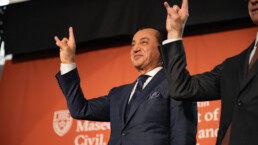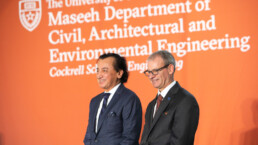by Cody Bowie
It’s another hot, “fall” day with the semester in full swing, and hundreds of students, faculty and staff pack the stairs and floor of the Engineering Education and Research Center. A sea of burnt orange fans that read THANK YOU in large, white text wave in unison. Exuberant cheerleaders ring the spiral staircase. On stage, UT President Jay Hartzell is joined by Dean Roger Bonnecaze, Department Chair Bob Gilbert, and Fariborz Maseeh, a distinguished alumnus of the Cockrell School of Engineering.
Maseeh steps up to the podium. He talks about trends in technology over the past 50 years — trends that have made our phones, computers and attention spans smaller. He discusses integrated circuits and software and microprocessors — the tiny network of technology that microscopically supports our every whim.
This technology, he says, this era of tiny things — it has made us forget about the big problems facing our world.
excerpts From Maseeh’s speech, from department renaming celebration held september 2023
“Because we are entertained, we have been less conscious about our surroundings. As a result, during the past several decades we have ignored some of the fundamental necessities of our existence. Vital issues such as water safety, air pollution, ocean waste, traffic, infrastructure, and the rights of other living beings have been largely ignored.
“Fortunately, there is one department that has the breadth and depth to deal with these vital issues, and that is civil, architectural and environmental engineering. This is the department that will make our air better, our water cleaner, remove ocean waste so sea life can prosper, build efficient and monumental cities and improve transportation efficiencies. Civil engineers are architects of dams, bridges and high-rises that will last hundreds or even thousands of years. Civil engineers are people that can do big things. No other department has the scope and the portfolio that this department has.”
Maseeh would know. He has made a career out of the intersection between the tiny and the big, from creating microscopic chips to working on a nuclear construction plant.
Everyone claps. The speakers and audience turn toward the back of the stage. With a sound like wings taking flight, a black cloth is suddenly dropped and the department’s new name is revealed in burnt orange splendor: The Fariborz Maseeh Department of Civil, Architectural and Environmental Engineering.
At the same time, in adjoining Ernie Cockrell Jr. Hall, brown paper is quietly removed from a new sign and plaque that commemorate the department naming. Students who have been curiously peeling back tape to peek under the paper for days approach the plaque, fingers tracing the etched letters announcing the new department name. A student pauses when she reaches Maseeh’s name. “Oh,” she tells her friend. “I knew he was from Iran.”
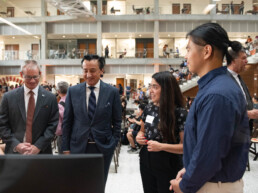
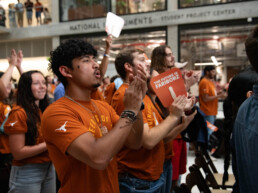
To fully understand Maseeh’s commitment to academia, it’s essential to understand his journey.

Maseeh arrived in Portland, Oregon on a rainy Saturday in 1977. It was the early days of the Iranian Revolution, and the University of Tehran was largely closed, a major hurdle in Maseeh’s quest for higher education. So, he applied for universities in the United States where he could pursue a degree in civil engineering. Portland State University offered the quickest admission timeline. Just three weeks after applying, he received his acceptance.
He borrowed money from his uncle to pay for his plane ticket, holding off on telling his father until the last possible moment. His father had always encouraged his education, telling him about U.S. universities where he could someday study. Although angry at first, Maseeh’s father came around. When he arrived in Portland three weeks later, Maseeh didn’t speak much English and didn’t have a place to stay. A security guard helped him find a place to sleep for the night.
“I had to grow up fast,” he says. “But I believe that immigrants actually have an advantage. As an outsider in a new society, they can see the society from an outsider’s lens. They can see more of the forest than the trees. Because of that capability they can choose which part of the forest they enter into, and that is unique to immigrants.”
At Portland State University, he entered the forest through civil engineering. A construction boom in Iran made civil engineering an appealing option, as Maseeh planned to return home after completing his degree.
In 1979, however, the Iranian Revolution culminated in the overthrow of the Pahlavi dynasty. Maseeh’s mother and sisters immigrated to Portland. Because he could no longer go home to work in Iran, and because the United States was in a recession that limited job openings, Maseeh finished his undergraduate degree in just three years. He then decided to continue his education at The University of Texas at Austin.
“I had never been to Austin. The reason I came to UT was because I wanted to pursue my graduate studies at a top ranked school, and UT Austin for civil engineering was and continues to be one of the top-ranked schools in the nation, if not the world. So, it was an attraction of best faculty and best educational system.”
He pursued a master’s degree in civil engineering at UT, doing research in what was then the Department of Aeronautics. He enjoyed living in Austin, and was a frequent visitor of Sixth Street in the early 80s. It was at this time that his father, who had been trapped in Tehran, was finally able to join his family in America. When his father visited him in Austin, Maseeh saw a very different version of the man he remembered. He looked aged well beyond the couple years that passed, so he decided to leave Austin, work on his thesis remotely and go back to Portland and help out.
But life got in the way of finishing his thesis. In order to support his family, Maseeh started his first business, a car dealership. The company thrived after several years, and Maseeh returned to graduate studies — this time, pursuing a master’s degree in mathematics from Portland State University.
Although Maseeh had not completed his degree at UT, his experience on the Forty Acres inspired him to continue his educational journey beyond his master’s degree. He received a job offer in construction at a nuclear power plant after graduating from Portland State University, but he decided to apply to MIT instead, bolstered by recommendations from several of his UT professors.
“I was 100% certain that I couldn’t get an admission from MIT,” Maseeh said in an interview for the MIT Infinite History Project. “I mean, I went to the University of Texas, but I didn’t have a degree because I never finished, never submitted my thesis. As I was preparing to leave for Chicago, I got this letter from MIT. And it was in a thin, white envelope. And I had seen those before. I was certain that letter started with, “We regret to inform you…”
So Maseeh didn’t open the letter. Days later, a friend pointed it out on the dashboard of Maseeh’s car. Why don’t you open it? The friend asked. Maseeh waved him off, saying he already knew it was a rejection. Well, can I open it? His friend asked. Maseeh acquiesced.
“He opened it. And he remained very quiet. And he just handed it to me. And I couldn’t believe it started with ‘Congratulations!’ And so now, two days before leaving for my first real job, I get this miracle admission from MIT for a doctoral program,” Maseeh said in the MIT interview.
Maseeh rejected the offer. Or more accurately, he ghosted it — never replying to the letter or calling the admissions office. He moved to Chicago and took the construction job which was easy and paid well. For a time, he was content.
But after seven months, he regretted the decision to leave academia. He missed the academic rigor, the community of faculty and researchers that had so shaped him at UT, and wished he had given it a chance at MIT. He called the admissions office and asked if they still had a spot for him. Angrily, they told him that it was a spot for September. It was January. Nothing could be guaranteed anymore.
“So, I decided to quit the job, put everything that I had in my car, sold everything else that I had,” Maseeh said in the MIT interview. “And I drove from Chicago to Boston in mid-January of 1986. And I arrived in Boston for the first time, found the school and went and told them, look, I’m here. I’m going to be here anyways. So, they readmitted me. But they told me they couldn’t offer student aid, and didn’t even have a dorm for me to be in.”
But those issues worked themselves out within a few weeks. And Maseeh hopped back in the academic saddle, and he did it at the university his father had him dreaming about from childhood.
“The last 50 years of our history, we’ve been in the era of what I call ‘tiny things.’ The advent of microprocessors, software and the other innovations that led to PCs and handsets. We’ve been very fortunate to have evolved our knowledge and our access because of that era of tiny things.
“But over next 50 years, I think we need to deal with bigger issues that are emerging in our society. Changes in the environment, weather, air quality, ocean pollution, transportation systems and traffic jams — these are the big societal issues that CAEE can rally around to address. That is what I call the engineering of the big, and UT has one of the top departments in these areas. I think UT can become the leader in solving some of these big challenges.”
Maseeh is no stranger to the world of tiny things. While studying civil engineering at MIT, he got a job at the university’s Microsystems Technology Laboratory. It was in this role that he was first introduced to MEMS, micro-electromechanical systems.
MEMS are electronically fabricated devices ranging in size from one millimeter to one micron. Often smaller in diameter than a strand of hair, MEMS are a chimera of technology old and new, combining electronics that were still nascent in the 1980s — microsensors, microprocessors and microactuators — with minute fabrications of man’s earliest tools — springs, channels and cavities. MEMS are vital to everyday technologies that switch our cell phones’ orientation when they are flipped and senses when the temperature drops and the heat needs to kick on at home.
Pursuing his passion for tiny chips, Maseeh founded the company IntelliSense Corp. in 1991. Two years later, the company ran out of money. Maseeh made the difficult decision to shutter his business. He began calling all of his business contacts and letting them know IntelliSense would be closing.
One of these contacts was Kirtland Air Force Base, with whom IntelliSense had a proposal pending. Maseeh asked if it would be possible for the receptionist who had answered the phone to tell him if a decision had been made concerning the proposal, and since he was going out of business anyway, couldn’t she just tell him now if it was accepted or not?
The woman put him on hold. When she returned, she sounded frazzled, annoyed. But she said something that would change Maseeh’s life forever: “Sir, we cannot notify you of any decisions. It’s against the rules. You have to wait until everybody else is informed at the same time. But if it was me, I’d wait.”
Maseeh waited. Two weeks later, he was notified that IntelliSense had won the contract. Several weeks later, another contract came through. IntelliSense went on to become one of the fastest-growing microelectromechanical systems and empowering engineering companies in the world at the time, which significantly reduced manufacturing time. It was acquired by Corning in 2000.
“There have been a lot of ups and downs,” Maseeh said. “I left my master’s degree unfinished because I had to go help my family. When I started a company, I ran out of money. When I moved to America I had to start from scratch. But many of them, if not all of them, have become a blessing, not a disadvantage. They were not failures; they were just moments in my life. And I think every one of them was very helpful when I look back at the impact they had on the trajectory of my success.”
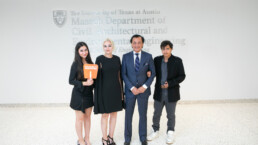
“My family has been impactful in my philanthropic activities by teaching me that when you give, you will receive, and that usually is a good motivation for anyone starting their charitable activity. When you give a lot, at some point it becomes more of a habit and you generally become more philanthropic without having any expectations.”
Today, Maseeh invests in the kinds of future leaders who will bridge the gap between the tiny and the big to solve society’s most pressing challenges. In addition to the Fariborz Maseeh Department of Civil, Architectural and Environmental Engineering, he has invested in the Fariborz Maseeh Department of Mathematics + Statistics at Portland State University and Fariborz Maseeh Hall at MIT, to name a few.
Maseeh’s philanthropy goes beyond academia. He is the chairman and managing principal at Surlamer Investments, a private wealth management firm that invests in emerging, innovative ideas and helps them become thriving businesses. He also manages The Massiah Foundation, a venture philanthropy firm that invests in transformational ideas.
In a twist of fate, he received his master’s degree in civil engineering from The University of Texas in 2008 when someone realized that he had, in fact, completed all the necessary requirements to graduate. In 2011, he was named a Distinguished Engineering Graduate of the Cockrell School of Engineering.
These investments – including naming the Fariborz Maseeh Department of Civil, Architectural and Environmental Engineering – share a common goal: to ensure that future leaders are equipped to handle the big issues facing our society.

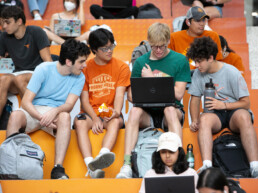
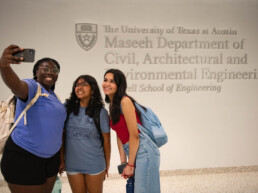
"Now you’re trying to give back to it to nourish others."
“It’s a tremendous honor and privilege to be blessed with the capabilities to come back and give back to this school that has had such an impact on my life. And the fortunate part of this is that UT is one of the best schools in the world and that’s the cherry on top. You come back to a school that nourished you, but now you’re trying to give back to it to nourish others.”

